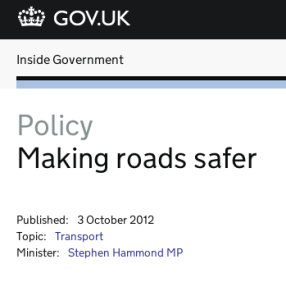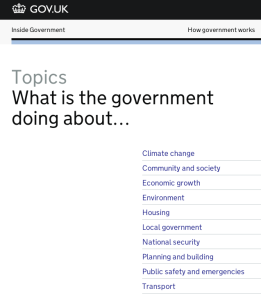As departments move from publishing on separate websites to publishing on GOV.UK, each of them will be contributing to a comprehensive set of web pages that explain government policies clearly, consistently, and all in one place. Doing this is difficult, but we think it's important.
What problem does this solve?
To get a comprehensive understanding of any policy area now, you need to know which government departments are involved. Often you will need to review more than one department’s website, and refer to a range of different types of documents (including business plans, speeches, announcements, policy papers and web pages).
You can’t be sure you’ve found everything that’s relevant, and it can be difficult to tell which information is the most definitive and up to date.
The result is that it can be difficult for people to find out what the government is doing about any given issue.
A consistent approach
On the Inside Government team, we are defining a policy as ‘a statement of the government’s position, intent or action’.
Each policy is named according to the outcome the government wants to achieve. For example, there will be policies on making roads safer, increasing the number of available homes, reducing greenhouse gas emissions from transport.
 We’ve developed a template - a few simple headings - that will be used for all policies on GOV.UK. Each policy has its own page which explains the issue, actions and background, gives further detail about the actions for those who are interested, and includes a feed of announcements and publications so that users can keep up to date.
We’ve developed a template - a few simple headings - that will be used for all policies on GOV.UK. Each policy has its own page which explains the issue, actions and background, gives further detail about the actions for those who are interested, and includes a feed of announcements and publications so that users can keep up to date.
We tested this approach earlier this year and have been working with departments to refine it, ready for the first two departments to launch their policy pages when they move to GOV.UK on 15 November. We’re aiming to have a complete set of pages, representing the work of all government departments, by March 2013.
Where more than one department is taking actions to achieve the same outcome, there will be one policy which includes the actions of all relevant departments. The number of these will increase as more departments transfer their sites to GOV.UK.
We expect there will be around 250 policies in total, associated with about 40 topics (broader themes like climate change, transport and national security).
Losing the jargon but keeping the detail
 Policies are complicated things, and many people who visit departmental websites are interested in the detail of what is being done, when and how. We’re not losing the detail or necessary complexity, but we are working with departments to provide clear, succinct information.
Policies are complicated things, and many people who visit departmental websites are interested in the detail of what is being done, when and how. We’re not losing the detail or necessary complexity, but we are working with departments to provide clear, succinct information.
The default language of policy - non-specific, overly complex and adjective-laden text - isn’t just unpleasant. It is confusing, impenetrable to non-experts, and open to misinterpretation. So we’re applying the GOV.UK design principles to policies, expressing them in clearer, more specific and plainer language. We’re cutting out metaphors, and trying to make paragraphs and sentences shorter and more specific.
We hope this will make policy information more accessible to a wider audience, and more useful for experts. It should provide a clearer basis for civil servants to work with others to develop policies, and a useful context for the huge amounts of data and information that departments publish.
How can we improve?
By doing all this, we’re hoping to make it much easier for people to find the information they are looking for on any policy issue.
As ever, we are learning as we go. We’re keen to carry on improving the way we present policies on GOV.UK. If there’s anything you think we can do to make policy pages clearer and more useful once these pages are in the open, please let us know.


8 comments
Comment by Dr CAS posted on
Explaining policies is one step, but how about explaining how policies come about? All too often we see Labour and Tory governments continuing with the same stream of policies, policies which have often been implemented in the US before they are introduced here. Policies which the US has shown to be utterly disastrous are also implemented in this way. Why is this? What role do the Civil Service, think tanks and pressure groups play in putting forward policies which naive politicians merely tick-off? The system as it is clearly is not democratic and clearly does not work well.
Comment by Jane Venable posted on
I cannot find DoH (2004) Choosing Health: making healthy choices easier on either gov.uk or the national archives. Where has it been moved to? Although older documents may not seem important, I need to be able to access them.
Comment by paulclarke posted on
Here's the direct link to the document on the National Archives site: http://webarchive.nationalarchives.gov.uk/+/www.dh.gov.uk/prod_consum_dh/groups/dh_digitalassets/@dh/@en/@ps/documents/digitalasset/dh_133489.pdf
We're working to resolve the problem that's caused this issue with some of Department of Health's much older content.
Comment by What’s up GOV? | Internet Newsletter for Lawyers posted on
[...] and information in one place and all designed to be “simpler, clearer, faster” – is that a Good Thing or “some kind of Orwellian [...]
Comment by Inside Government – traffic, demand and engagement numbers so far | Government Digital Service posted on
[...] satisfying to see policies up there because everyone has worked hard to produce a new and compelling way to access and read government policies. And when we look at the next ten most popular pages, there are three specific policies alongside [...]
Comment by Rewriting policy plainly | Government Digital Service posted on
[...] wrote recently about how we’re presenting policy differently on Inside Government, but what does that mean for individual departments? Paola Wright, Online Policy Desk Officer for [...]
Comment by A quick tour of Inside Government | Government Digital Service posted on
[...] Explaining government policy [...]
Comment by What we know about the users of Inside Government | Government Digital Service posted on
[...] official source of information about who is in the UK central government, how they are structured, what they are thinking and what they are doing about it. All of us instinctively feel that this information should be available in the public domain and be [...]